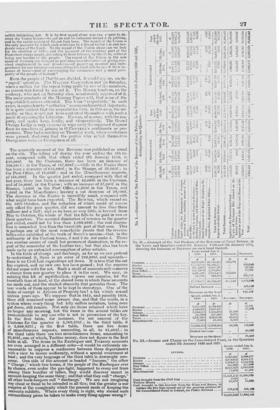The quarterly account of the Revenue was published as usual
on the 6th. The falling, off during the year ending the 5th insant, compared with that which ended 5th .January 1830, is 640,000/. In the Customs, there has been an increase of 320,000/.; in time Taxes, of 117,000/. ;—while in the Excise there has been a decrease of 854,0001.; in the Stamps, of 39,0094 ; in the Post-Office, of 18,0001.; and in the Miscellaneous imposts, of 1 6 6,0 0 0/. In the quarter just ended, compared with that of last year, there has been a decrease of 82,000/. in the Customs, and of 38,000/. in the Excise ; with an increase of 27,000/. in the Stamps, 9,000/. in the Post Office,45,000/. in the Taxes, and 9,000/. in the Miscellanies; leaving a net decrease of 29,e00/. The decrease in the Excise is incredibly small, compared with what might have been expected. The Beer-tax, which ceased on the 10th October, and the reduction of which could of course only affect the past quarter, did not amount to less than three millions and a half; and as no beer, or very little, is brewed from May to October, the whole of that tax falls to be paid in two or three quarters. The nominal diminution of revenue in the quarter just ended, could not be less than 1,000,0001.; the real diminution is somewhat less than the twentieth part of that sum. This is perhaps one of the most remarkable proofs that the revenue tables ever exhibited of the truth of Swrier's maxim—that, in the arithmetic of the Custom house, 2 and 2 do not make 4. There was another source of small but permanent diminution, in the repeal of the remainder of the Leather-tax ; but that also has been made up by an extended consumption of other articles. In the table of charge and discharge, as far as we can pretend to understand it, there is an error of 200,0001. and upwards— there is no Civil List expenditure set down. It is true that the act has expired, and no new one has been passed ; but the expense did not cease with the act. Such a mode of accounts only removes a charge from one quarter to place it in the next. We may, in noticing this bit of mystification, express our surprise, for the twentieth time at least, at the absurd form in whieh these accounts are made out, and the studied obscurity that pervades them. The very words of them appear to he kept in stereotype. One of the items of receipt is Arrears of Property-tax! a tax which ceased sixteen years ago. We suppose that in 1815, and possibly 1816, there still remained some arrears due, and that the words, in a system where every thing but folly suffers mutation, being once put down, still remain. Not only are items retained which have no longer any meaning, but the items in the several tables are irreconcikable to any one who is not in possession of the key. In the first table, for instance, the net amount of the Customs for the quarter is 3,769,6951.; in the third table, it is 2,680,8371.; in the first table, there are five items of miscellaneous imposts, amounting, in all, to 81,4011.; in the third table there are two miscellaneous items, amounting to 93,089/., one of which, Tontine money, does not figure in the first table at all. The items in the Exchequer and Treasury accounts are even arranged in a different order—it would be extremely unreasonable to suppose a conference between these departments with a view to insure uniformity, without a special enactment at least ; and the verylanguage of the third table is downright nonsense. One side of the account is headed "Income," the other "Charge ;" which two terms, if the people of the Exchequer ever by chance, even under the gas-light, happened to creep out from among their bundles of tallies, they would discover meant in account-keeping the same thing; and that what they call "charge," all other book-keepers call "discharge." We are not imagining any cheat or fraud to be intended in all this; but the greater is our surprise at the complexity which the present mode of keeping the accounts exhibits. Where every thing is right, why should such extraordinary pains be taken to make every.thing appear wrong ?\


























 Previous page
Previous page